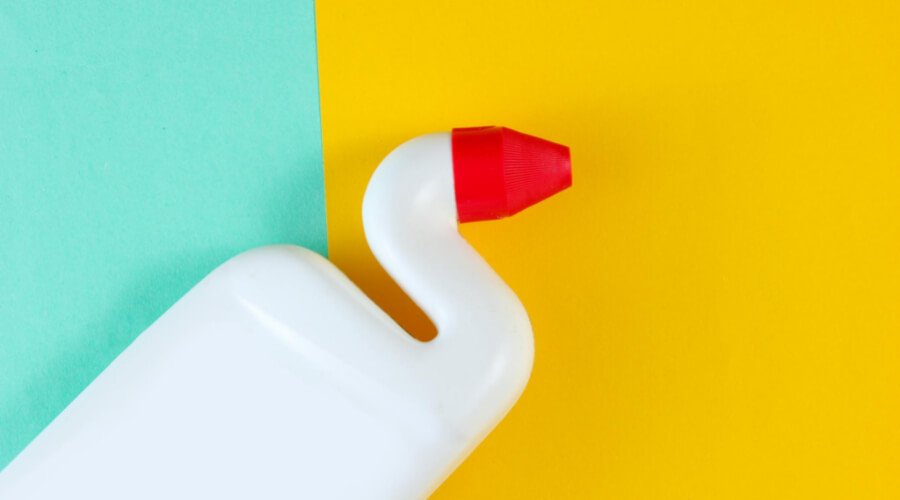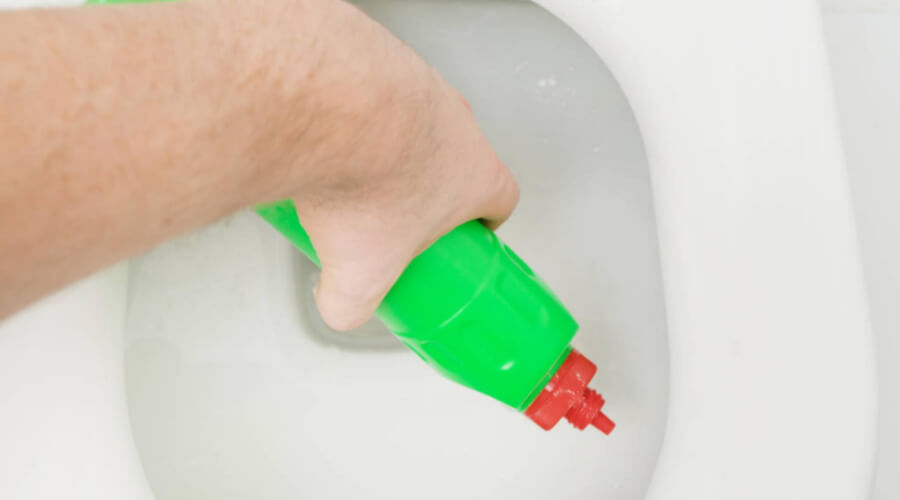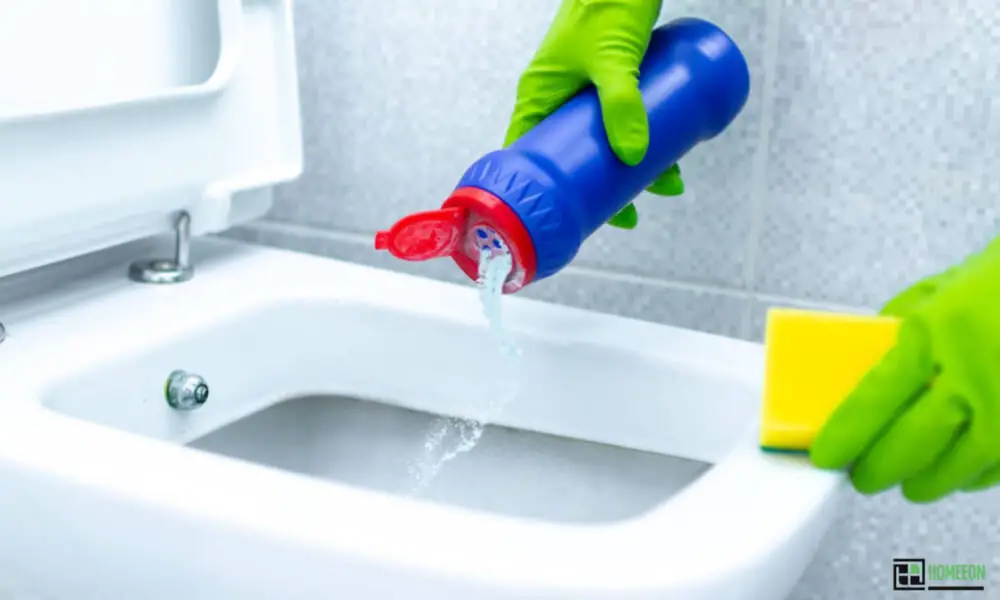Last Updated on July 22, 2023 By Emma W. Thomas
In case of inhalation of bleach and toilet bowl cleaner fumes, move to fresh air immediately, and avoid further exposure. If symptoms are severe, seek medical attention promptly by calling 911. If you have no trouble breathing after exposure to the fumes, dial 800-222-1222 to contact your local Poison Control Centre for help.
What Are The Symptoms Of Exposing Yourself To Bleach And Toilet Bowl Cleaners’ Fumes?

Several symptoms can indicate exposure to bleach and toilet cleaners gases, including;
- Breathing difficulties and sometimes wheezing
- Severe pain and burning sensation in the throat, mouth, and food pipe. One may also experience this pain in the nose, eyes, and ears.
- Headache, vomiting, and nausea (you may also experience blood in the vomit)
- Severe abdominal and stomach pain that may include cramping
- A sudden decrease in blood pressure and loss of vision
- Severe changes in blood pH will affect many body organs and parts
- Coughing, burning, and watery eyes
- Seizures, and in some cases collapse and coma
How Can You Prevent Bleach And Bowl Cleaner Poisoning?

You can avoid chlorine and ammonia poisoning by following these steps;
- Ensure that the cleaning products and bleach remain in their original containers
- Read carefully and follow the instructions, warnings, and directions on product labels before use. If any instruction is not clear, be sure to call the information number found on the label.
- Avoid mixing chemicals as this can be fatal.
- Never clean diaper pails, pet urine stains, or litter bins using bleach. Urine contains little amounts of ammonia, which can react with chlorine in the bleach.
- Ensure that you have enough ventilation when using strong cleaners for fumes to get out
- Choose products that are certified by Environmental Protection Agency (EPA) for safety standards.
What Is The Cure For Chlorine Poisoning?
Most household and industrial products contain chlorine, and one needs to handle them with care. Since chlorine is poisonous, one should not inhale or swallow it. You will find chlorine in household products like; bleaches, disinfectants, cleaning products, water purification products, and other chemicals.
When chlorine comes into contact with water, the two react, forming hypochlorous and hydrochloric acids, which are very toxic. It is, therefore, crucial to avoid inhaling or ingesting chlorine when using products that contain it, as it may react with water in your body and form these acids.
But, if you accidentally inhale or swallow chlorine, the following quick actions will help;
- Move to a well-ventilated area.
- If chlorine contaminates your clothing or skin, take out the clothes and use soap and water to wash your whole body.
- If you have blurred vision or burning eyes, use clean water to rinse them thoroughly and remove the contact lenses, if any.
- Avoid taking any fluids after swallowing chlorine, and do not force it out by vomiting.
- Seek medical help immediately by visiting the nearest hospital
- If you are in the US, you can call the helpline number 1-800-222-1222 and ask for help from the National Poison Control Center
How Do Doctors Treat Chlorine Poisoning?
A person with chlorine poisoning is usually treated in the emergency department in a hospital. A doctor will primarily focus on removing chlorine from the body as fast as possible using activated charcoal or medication. The specialist may also use gastric suction to empty the victim’s stomach. In this process, a tube is inserted into the stomach through the mouth or nose. The doctor then drains the contents of the stomach through the tube.
A doctor can also order some more tests to know the extent of chlorine poisoning. The tests may include; endoscopy, chest x-ray, ECG (electrocardiogram), or bronchoscopy. If a person has severe chlorine poisoning, they may require extra care in the hospital. This added care helps to support breathing and also treat the symptoms.
How Can You Avoid Inhaling Bleach And Toilet Bowl Cleaner?
Preventing is always better than cure, so knowing how to avoid the inhalation of bleach and toilet cleaners fumes. Always try the following safety methods when using these products.
- Use the products in a well-ventilated room to ensure proper circulation of air and drive out any fumes. Make sure that you open all windows and doors. You can also switch on your fans to help eliminate the fumes if necessary.
- Be sure to follow the directions on the label when using the cleaning substances. Never mix bleach with other cleaning products. Be sure to use the right amount, as using too much would lead to excess toxic fumes. If you use less than what is recommended on the label, you risk not killing all germs and pathogens.
- You can also wear protective gear like rubber gloves, covering clothes, and eye protection. Doing this helps to protect your eyes and skin from contact with any harmful chemicals.
- Please wash your hands after using the chemicals to prevent spreading them to other parts of your body.
- Use the right products for your cleaning services; for example, avoid substances that can trigger a reaction if you have any health issues. You can opt for eco-friendly substances to use in your home if you are unsure what could affect you negatively.
Conclusion
While most household products such as bleach contain chlorine, it is possible to avoid its poisoning through careful handling. Always ensure that you do not mix cleaning substances and use them in a well-ventilated room. You can also use protective clothing and gear and avoid any contact with the eyes and skin.
But, if you inhale the fumes from bowl cleaner and bleach, ensure that you first get to a place with a lot of fresh air. You can then seek medical assistance or get help from a poison control center by calling them.
References:
https://dubawa.org/the-dangers-in-mixing-toilet-cleaner-with-bleach/
https://cleancurious.com/what-to-do-if-you-mix-toilet-bowl-cleaner-with-bleach/
Emma is a graduate of Domestic Science or Family and Consumer Sciences (Home Economics) from the University of Wisconsin. She has 7 years of experience Working with the strategic section of BestBuy and now writing full-time for Homeeon.
From Managing the Home, Interiors, Cleaning, and Exteriors to Gardening and everything about Making A Home Liveable – is her passion and this Homeeon is the result of this.
Emma loves decorating her home with the best stuff found online. She cares about quality over anything and writes reviews about them here in Homeeon. Get in touch with her over Pinterest.
Keep reading her blogs.
